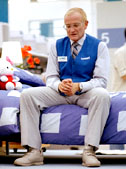
Movie Guru Rating:

Comment
on this review
| |

Little to care about in the hollow, trite One Hour Photo
by Zak Weisfeld
This is not my beautiful house. This is not my beautiful wife.
I do wonder as I drop my little rolls of film into the box at the photo place what those who develop the film think of me. What insight do they get into my life as they gaze at the pictures of me and my gorgeous wife cavorting on some exotic beach; or exploring a magnificent, old world castle; or the holiday snapshots of our drunken friends staggering about our delightful home? Do they envy me and mine? Alternately, do they despise us? Find our yuppie lifestyle hollow, our vacations trite and bourgeoisie? Trying to discern any information from the employees who hand me my pictures is difficult work at best. They invariably mask their feelings about me and my life behind the kind of chilling poker face that only comes from working in a national retail chain. But what if it's not a poker face at all? What if they don't care a bit? What if they didn't even look at the photos? Chilling, I know.
But, if One Hour Photo is to be believed, even at the most soulless superchain, someone is watching you very, very closely. In this case, the person doing the watching is Sy Parrish—a man so pasty, so awkward, and with such tragic glasses that his nametag may as well read, "psycho stalker."
And the people being stalked, via their snapshots, are the Yorvick family. The Yorvicks are just like you and me except that they're beautiful, successful, and live in an Architectural Digest centerfold. For some reason, lonely, psychotic Sy has taken more than a simple liking to the Yorvicks—as we discover when we visit Sy's lonely, sterile, psycho apartment in a lonely building in the lonely downtown of some lonely, unnamed, West Coast city.
Inside we see that it is nearly empty and is illuminated with the green fluorescence that is the contemporary equivalent of the waxed, twirled moustache tip. On one vast and gloriously lit wall sits a photo collage of the Yorvicks' finest moments. And a lovely collage it is, beautifully composed, meticulously arranged, unfinished, and creepy—the kind of work that, if Sy knew the right people in SoHo, would have him sipping a nice pino blanc while headlining the Outsider Art Show. But, instead, tacked to the wall of his lonely psycho apartment, it becomes nothing more than a rather too obvious metaphor for the emptiness of his own life and his obsession with the perfect Yorvicks.
As Sy Parrish, Robin Williams is playing a kind of anti-Robin Williams. A tight-lipped, tightly-wound, textbook movie psycho, Sy is the kind of exercise in The Method that actors desperate to turn their careers in another direction resort to just prior to buying a home in Santa Fe or getting a new psychic.
Unfortunately for Williams there's no there there when it comes to Sy. He's a cliché in velcro shoes and a blue vest. Even Sy's ultimate revelation, the one that's supposed to bring gravity to the aimless One Hour Photo, is one that would embarrass a college literary magazine. It's a great big secret I will reveal right here. Sy, it turns out, was abused as a child, forced by his father to appear in pornographic pictures.
Not only is Sy's confession a bit of a dud (not to mention a great disservice to those who have been abused) but it also ends up explaining nothing about who he is or what has happened except in the most painfully literal way. Presumably if his father had abused him by forcing him to appear in motion pictures Sy would have worked in Hollywood.
And with the letdown of its hackneyed moment of revelation, One Hour Photo leaves us little to fall back on. The Yorvicks, despite their good looks and their centrality to Sy's obsession, barely exist. Which makes the film's jeopardy less than thrilling. I couldn't have cared less whether Sy photographed them or burned their lovely house to the ground—and it seemed as if the Yorvicks shared my feelings.
The problem is that director Mark Romaneck is clearly a huge (almost Sy Parrish-ish) fan of Stanley Kubrick. Every frame of One Hour Photo is lovingly composed and photographed. The SavMart where Parrish develops photographs is the love child of Wal-Mart and Kubrick's space station of 2001. His apartment is a study in green and ennui. And to be fair, it is beautiful. But it is also pointless.
Romaneck subsumes every aspect of the film to the overweening perfectionism of his photography. Every character is forced to play out the director's unrelenting vision, no matter the cost. The jerk manager, the shophappy wife, the sensitive kid—none of them have even the faintest whiff of human slop or grit about them. Like Kubrick with even less to say, Romaneck treats his actors and his script like apples in a perfectly lit bowl. But not even real apples, which might wither or change in some way unacceptable to the key light, but wax apples.
There are glimpses of the kind of movie that One Hour Photo could have been—funny, unruly, peculiar, sad, and a look inside Sy Parrish's universe of Orwellian retail. But the stalker photographer loner business is played. Though Williams is game to play it again, it's not enough to make the movie worth watching. Like the glossy, too perfect photographs that come already in the frame, One Hour Photo is too stiff, too formal and too cold to be really convincing, either as a character study or a thriller.

September 19, 2002 * Vol. 12, No. 38
© 2000 Metro Pulse
|





